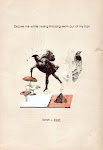Many people think German is ugly but I’ve come to love it. I’ve lived here almost two decades and still learn something new everyday. Some think the sound of German too hard. My brother finds it hilarious. When I visit him he greets me and the kids by shouting all the German words he knows (and laughing about it), a list that includes Schnitzel, kaputt and Totenkopf. We laugh, too. German is funny, sometimes, but also expressive.
I admit to loving all the high-falutin’ words that float about intellectual circles – Zeitgeist, Weltanschauung, Weltschmerz, lebensmüde, Schadenfreude- as well as words with less ambition.
One of my first favorites was fünf, a simple little one, meaning five. It reads as if you’re trying to clear lint from your nose. The /ü/ is pronounced like a deep /u/, only purse your lips and flatten your nostrils. Sort of. Fünf would make a good name for a cat or small dog, or a whiskered pig.
Another is wunderhübsch, which is the product of German’s ability to smush words, as many as you like, up together into a new word. Literally it means wonderfully pretty. The first and last time I heard someone use it was when Luisa was a baby and a young woman said Luisa was wunderhübsch. I found that very sweet. Luisa was and still is wunderhübsch, but this is not a word I hear much. Hübsch alone is also good!
I also like the words that start with /pf/, like Pfirsich, or peach. It’s such a jumble of consonants, and when you say it, it goes down so suddenly it’s hard not to be amused. I also love Pfeffer, Pferd, Pflaume, pfiffig, and I mourn the Pfennig.
One I learned fairly recently is Stickstoff – as in nitrates, used in fertilizer. This is a laugh. Don’t forget that in German an S before a consonant is pronounced sh. It’s funny to hear grown-ups having a conversation about Stickstoff.
One of the best words is doch, the word used to contradict a naysayer. It’s irreplacable, and I love it for its right-on usefulness rather than its sound. The closest English equivalent would be “did, too!,” (or "is, too") as in “you stepped on my foot,” – “no, I didn’t,” – “doch!”
I also love Schmutz (dirt, grime, smut) and Dreck (ditto) and Gejammer (wailing or complaining), and a lot of anatomical words. But I’ll leave those for another day.
Sunday, June 28, 2009
Subscribe to:
Post Comments (Atom)




11 comments:
Yeah, I'm one who likes the word smushing.
I grew up next to a family that used German in their home. It didn't stick much with me, I learned kaput. When I first went to Germany I help a guy on the side of the road, he went on and on about the problem with the car, all I understood was kaput.
The other word that stuck with me was a compound word, sheistkauf.
Schmuck always used to make us laugh when we were learning German at school. There was a film we were shown several times about going through customs at an airport and, for some reason, the line -spoken by the customs officer- "hast du schmuck?" (as I remember it) always brought the house down. It was a long time ago and I don't think we were particularly aware of it's use in US english.
To be even-handed about this, I suspect english as spoken by the english sounds pretty hilarious to non-speakers!
Then there's yiddish. A bit derivative - a mutt of many languages. Sometimes you don't even need the meaning of the word. The way they're served or spat out are enough.
Then again, I could just be meshuggeh... :)
- J.
I learned a new word first thing this morning - mucksmäuschenstill. Which means quiets as a mouse, only more so, and is three words smushed up together.
Jeff, I love Yiddish. I should spend some time with it. You're so right about how you know what it means without knowing what it means.
Ichen Zee Sprachen Zee Strudele en ein Strasse und Toten Krieg!
Sieg Heil!
du trinkst ein Tannenblutbad
My appreciation of the German language (its sound, actually) was reinforced when I first saw Wim Wenders' film, "Wings of Desire." [But see, I think the German title is better: "Der Himmel über Berlin"--so would it literally be, "The Sky Over Berlin?"]
genau!
How about how the word for victim, Opfer, means the same as offering, sacrifice. Everyone who has been the prey of a gang or died in a fire or been bitten by a shark is a sacrifice, literally an offering. Is it an ancient way to justify everything bad that happens?
How about how the word for victim, Opfer, means the same as offering, sacrifice. Everyone who has been the prey of a gang or died in a fire or been bitten by a shark is a sacrifice, literally an offering. Is it an ancient way to justify everything bad that happens?
Post a Comment